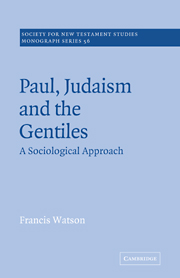Book contents
- Frontmatter
- Contents
- Preface
- Abbreviations
- 1 Paul, the Reformation and modern scholarship
- 2 The origins of Paul's view of the law
- 3 The Galatian crisis
- 4 Philippi, Corinth and the Judaizers
- 5 The situation in Rome
- 6 The social function of Romans: Rom. 2
- 7 The social function of Romans: Rom. 3–4
- 8 The social function of Romans: Rom. 5–8
- 9 The social function of Romans: Rom. 9–11
- 10 Conclusion
- Notes
- Bibliography
- Index
1 - Paul, the Reformation and modern scholarship
Published online by Cambridge University Press: 11 November 2009
- Frontmatter
- Contents
- Preface
- Abbreviations
- 1 Paul, the Reformation and modern scholarship
- 2 The origins of Paul's view of the law
- 3 The Galatian crisis
- 4 Philippi, Corinth and the Judaizers
- 5 The situation in Rome
- 6 The social function of Romans: Rom. 2
- 7 The social function of Romans: Rom. 3–4
- 8 The social function of Romans: Rom. 5–8
- 9 The social function of Romans: Rom. 9–11
- 10 Conclusion
- Notes
- Bibliography
- Index
Summary
What is the nature of Paul's attack on Judaism and Judaizing Christianity? It is increasingly being recognized by New Testament scholars that the answer to this question can no longer be taken for granted.
According to the traditional approach stemming from the Reformation, Paul is attacking the idea that salvation can be earned by acts of obedience to the law, as held by his Jewish or Jewish Christian opponents. He himself preaches the gospel of salvation solely by the grace of God, and the idea that salvation is to be earned by man's achievement is therefore anathema to him. Judaism is thus presented as a religion of ‘works righteousness’, a form of Pelagianism according to which God has given us the law so that we might earn salvation by fulfilling it. Paul's gospel opposes such arrogance with its insistence on grace and faith alone. On this view, what is at issue between Paul and his opponents is a matter of pure theology and pure theory: they debate the merits of two rival answers to the question, How can man be accepted by God? Many scholars still believe that this interpretation of the Pauline texts is essentially correct.
But other scholars are dissatisfied with this approach. The fundamental question is whether or not such an approach can do justice to the historical and sociological context in which Paul was writing.
- Type
- Chapter
- Information
- Paul, Judaism, and the GentilesA Sociological Approach, pp. 1 - 22Publisher: Cambridge University PressPrint publication year: 1986



